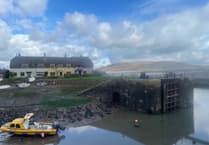STEPS were being taken this week to protect the ‘Dark Skies’ status of the Quantock Hills National Landscape.
The Quantocks management partnership said its nationally important landscape and ‘Dark Skies’ were under pressure from increasing light pollution from commercial development, street lighting, and security and other lighting for homes.
Partnership chairman Hugh Warmington said: “The Quantock Hills is a wonderful place to explore the night sky, but increasing levels of poorly designed development and a lack of thought of the impact of light spill is endangering this special quality.
“Starry skies are one of the most magical sights the Quantock Hills can offer.
“Light pollution limits people’s views of these skies and also disrupts the ecology of nocturnal animals.
“With ever increasing levels of development, especially on the Quantock Hills side of our surrounding major settlements, light pollution is likely to increase unless action is taken to address this issue.”
Now, a formal position statement has been issued to try to safeguard the nighttime environment by helping to achieve a consistent approach to conserving and enhancing dark skies by using recognised and respected standards developed by the Institution of Lighting Professionals and the Commission for Dark Skies.
The statement was also intended to help secure appropriate policies on the issue in the local development and neighbourhood plans of Somerset Council.
The Quantocks, which was designated the UK’s first Area of Outstanding Natural Beauty (AONB) in 1956 - renamed in November as a National Landscape – is ranked sixth in England for its dark skies.
Mr Warmington said: “The position statement is our first step to protect our dark skies for our future communities.”
Quantocks manager Iain Porter said: “The position statement has already allowed the communities and our partner organisations to engage with the National Landscapes team, raising local awareness and allowing dark skies to be better considered in planning and land management.”
As well as safeguarding the special quality of the dark sky environment, the position statement seeks to reduce energy waste associated with unnecessary outdoor lighting, conserve and enhance the conditions for astronomical research and stargazing, raise public awareness of the issue, and give broad guidance to land managers, farmers, developers, architects, householders, parish councils, and local authority decision-makers and highway authorities.




